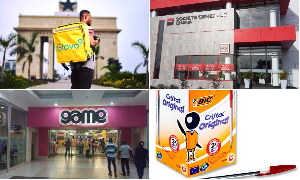- Home - News
- TWI News | TV
- Polls
- Year In Review
- News Archive
- Crime & Punishment
- Politics
- Regional
- Editorial
- Health
- Ghanaians Abroad
- Tabloid
- Africa
- Religion
- Election 2020
- Coronavirus
- News Videos | TV
- Photo Archives
- News Headlines
- Press Release
General News of Monday, 5 February 2001
Source: By Charles Benoni Okine
Ghana Telecom begins $24m fibre project
 GHANA Telecommunication Company limited (Ghana Telecom) has begun the construction of a $24 million optic fibre cable under the sea in a move to improve its broad band signals as it joins the elite in the world's telecommunications industry.
GHANA Telecommunication Company limited (Ghana Telecom) has begun the construction of a $24 million optic fibre cable under the sea in a move to improve its broad band signals as it joins the elite in the world's telecommunications industry.
Known as the SAT-3/WASC/SAFE Optic Fibre Submarine Cable Project, the project involves the laying of optic fibre cables to cover a distance of six kilometres from the shore to link terminal stations from 17 other countries in Europe and Africa which are part of the project.
They are Portugal, Spain, Carnaris Island, Senegal, Cote d’Ivoire, Benin, Nigeria, Gabon, Angola, Mauritius, Malaysia, Cameroon, India and South Africa, among others.
Mr Frank Gyawu, the project Manger, who disclosed this to newsmen on Friday at the project site behind the Accra office of Ghana Telecom, said the project is the brainchild of the African Telecommunications Operators and spearheaded by Telkom South Africa.
He revealed that the total cost of the entire project which starts from Portugal and ends at South Africa is estimated at $508 million.
He said Ghana Telecom is the sole financier of its share of the project which is scheduled to be completed by the first quarter of next year. Ghana Telecom has completed the construction of the operations room where signals from the project will be received and transmitted.
Mr Gyawu said other giants in the industry, namely, British Telecom, AT&T, France Telecom, Cable and Wireless, Teleglobe, Alcatel, among others, have a stake in the multi-million dollar project.
He said the project will give Ghana Telecom an alternative to its satellite system which is often disrupted by changes in the weather adding "this one has been built against storm and earthquake and can accommodate about 30,000 talking lines at the same time without congestion".
Mr Gyawu said the project will drastically improve the reception and remove the congestion experienced when making international direct dialling calls, facsimile, data communications, video transmission as well as feed the growing Internet service providers with quality signals in a digital form.
He said upon completion, calls from Ghana to neighbouring countries, which, hitherto, had to go through Europe due to lack of direct lines will be eliminated to reduce cost and improve efficiency in reception.
Giving a background to the project, which he described as an innovation in the telecommunications industry, Mr Gyawu said African Telecommunications Operators spearheaded by Telkom South, initiated the submarine cable project christened (SAT-3/WASC), in May 1997 with the signing of a Memorandum of Understanding for feasibility studies on the project to be undertaken by 10 operators in Africa, including Ghana Telecom.
He said it was during the discussions for the implementation of the project that another submarine project dubbed SAFE, which was being planned, was incorporated after an agreement had been reached to merge the two projects.
Mr Gyawu said a further 25 landlocked African countries can link in to the cable system through terrestrial and satellite facilities.
"This cable will be 100 per cent owned by African operators who are signatories to the Memorandum of Understanding without any third party equity investment," adding that for the cable to have a commercial value and attract the participation of other big carriers, it was decided that the cable be extended to Sisimbra in Portugal.
He said "the project will not only support Africa's growing telecommunications requirements but also provide a secure, reliable alternative traffic route between Western Europe, the Americas and Asia."
Mr Gyawu said players will enjoy the illumination brought about by the information revolution that has already had such a dramatic impact in the West, Europe and the Far East and bring the people of Africa closer through more efficient and affordable communications.
When newsmen visited the project site, the contractors, Alcatel Submarine Network of France, and a local contractor, Aquatic, were busy laying the cables with the assistance of huge excavators and a vessel.










